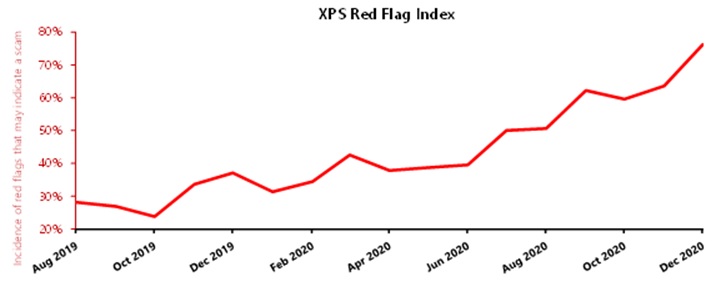Around 75 DB pension schemes members out of every 1,000 transferred their retirement pots last year, down from 96 in 2019.
Despite the 20% drop, the average transfer value rose 8% over the year to £259,000 ($383,807, €291,878), according to XPS Pension Group.
The firm’s Transfer Watch monitors how market developments have affected transfer values for a typical pension scheme member.
It also records how many members are choosing to transfer out.
Risky business
December 2020 saw the highest-ever level recorded on XPS’ Red Flag index, which indicates that a member is at risk of being scammed.
The last six months of the year saw a continuous rise in the number of red flags recorded, meaning that 49% of cases processed during 2020 showed at least one red flag.
This is up from 34% in 2019.
Mark Barlow, partner at XPS Pensions Group, commented: “Even though there has been significant turbulence along the way, transfer values finished 2020 higher than they started it.
“However, we have seen fewer people take the significant decision to transfer their pension during the year, perhaps put off by the current economic uncertainty.
“More concerning is the surge in pension scam red flags amongst those who have continued to transfer during the year.”
Helen Cavanagh, consultant at XPS Pensions Group, added: “Over three-quarters of cases raised a red flag in December which is extremely worrying.
“This highlights that the risk of members falling victim to a pensions scam which reinforces the call from the regulator for trustees and the industry to pledge to protect their members.
“Over half of all the scam warning signs identified over the month were fee related, including members lack of understanding of the fees involved, which could indicate members are transferring to arrangements that could be detrimental to their retirement outcomes.”









